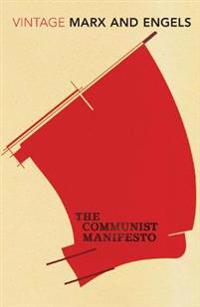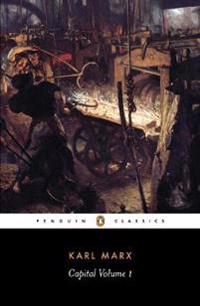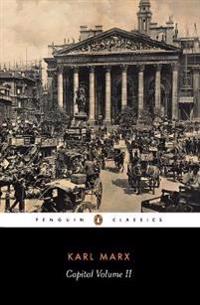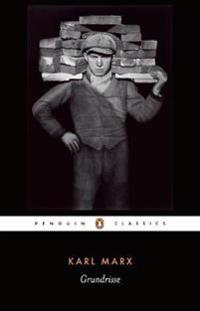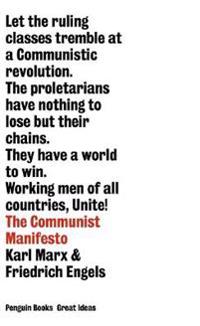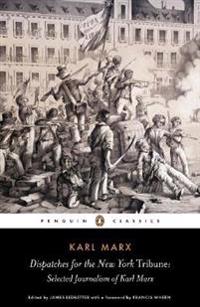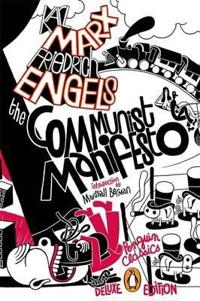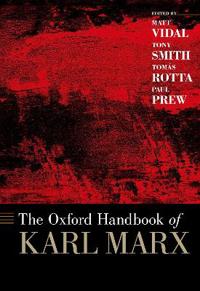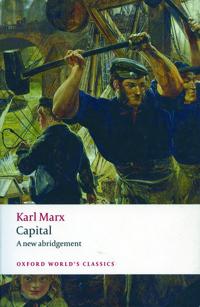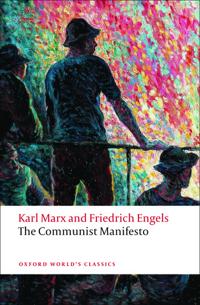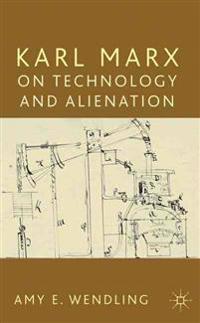Communist Manifesto (Häftad)
avKarl Marx, Friedrich Engels
ISBN: 9780099540748 - UTGIVEN: 201004Stating that the history of the societies is a history of class struggle, this title argues that communism is the only route to equality, and is a call to action aimed at the proletariat. It is intended for those seeking to understand our modern political landscape.[...]
Capital (Storpocket)
avKarl Marx
ISBN: 9780140445688 - UTGIVEN: 199012One of the most notorious works of modern times, as well as one of the most influential, "Capital" is an incisive critique of private property and the social relations it generates. Living in exile in England, where this work was largely written, Marx drew on a wide-ranging knowledge of its society [...]
Capital (Storpocket)
avKarl Marx
ISBN: 9780140445695 - UTGIVEN: 199205The "forgotten" second volume of Capital, Marx's world-shaking analysis of economics, politics, and history, contains the vital discussion of commodity, the cornerstone to Marx's theories.[...]
Capital (Storpocket)
avKarl Marx
ISBN: 9780140445701 - UTGIVEN: 199208The third volume of the book that changed the course of world history, Capital's final chapters were Marx's most controversial writings on the subject, and were never completed.[...]
Early Writings (Storpocket)
avKarl Marx
ISBN: 9780140445749 - UTGIVEN: 199201Written in 1833-4, when Marx was barely twenty-five, this astonishingly rich body of works formed the cornerstone for his later political philosophy. In the Critique of Hegel's "Doctrine of the State", he dissects Hegel's thought and develops his own views on civil society, while his Letters reveal [...]
The Grundrisse (Storpocket)
avKarl Marx
ISBN: 9780140445756 - UTGIVEN: 199304Written during the winter of 1857-8, the "Grundrisse" was considered by Marx to be the first scientific elaboration of communist theory. A collection of seven notebooks on capital and money, it both develops the arguments outlined in the Communist Manifesto (1848) and explores the themes and theses [...]
The Communist Manifesto (Storpocket)
avKarl Marx, Friedrich Engels
ISBN: 9780140447576 - UTGIVEN: 200206The political tract in which Marx presented the core of his philosophy and revolutionary program, with an introduction analyzing its significance to the realities of today and to Marx's own times.[...]
The Communist Manifesto (Pocket)
avKarl Marx, Friedrich Engels
ISBN: 9780141018935 - UTGIVEN: 200409Throughout history, some books have changed the world. They have transformed the way we see ourselves and each other. They have inspired debate, dissent, war and revolution. They have enlightened, outraged, provoked and comforted. They have enriched lives and destroyed them. Now Penguin brings you t[...]
Karl Marx (häftad)
ISBN: 9780141024806 - UTGIVEN: 2017-04SHORTLISTED FOR THE ELIZABETH LONGFORD PRIZE FOR HISTORICAL BIOGRAPHY 2017 'A deeply original and illuminating account of Marx's journey through the intellectual history of the nineteenth century...a profound reappraisal and a gripping read' Christopher Clark, author of The Sleepwalkers As the n[...]
Revolution and War (Häftad)
avKarl Marx
ISBN: 9780141043913 - UTGIVEN: 200908Written during Karl Marx's brilliant career as a polemical journalist, these blazing pieces tackle subjects ranging from the strikes of angry British workers to insurrection in Europe, from the American Civil War to the misery of colonial rule in India, demonstrating the radical spirit and outrage a[...]
The Communist Manifesto (Inbunden)
avKarl Marx, Friedrich Engels, Samuel (TRN) Moore
ISBN: 9780141395906 - UTGIVEN: 2015-04'The Communist Manifesto' is one of the most influential pieces of political propaganda ever written. It is a summary of the whole Marxist vision of history and is the foundation document of the Marxist movement.[...]
The Communist Manifesto (Häftad)
avKarl Marx
ISBN: 9780141397986 - UTGIVEN: 2015-02'The proletarians have nothing to lose but their chains.' Marx and Engels' revolutionary summons to the working classes - one of the most important and influential political theories ever formulated. Introducing Little Black Classics: 80 books for Penguin's 80th birthday. Little Black Classics celeb[...]
Dispatches for the "New York Tribune" (Storpocket)
avKarl Marx
ISBN: 9780141441924 - UTGIVEN: 200703Karl Marx (1818-1883) is arguably the most famous political philosopher of all time, but he was also one of the great foreign correspondents of the nineteenth century. During his eleven years writing for the "New York Tribune", Marx tackled an abundance of topics, from issues of class and the state [...]
Communist Manifesto (Häftad)
avKarl Marx
ISBN: 9780143106265 - UTGIVEN: 201106This is Marx and Engel's landmark treatise - in a graphic deluxe edition. One of the most important and influential political theories ever formulated, "The Communist Manifesto" is a revolutionary summons to the working class - an incisive account of a new theory of communism that would be brought a[...]
Demolition on Karl Marx Square
ISBN: 9780190645120 - UTGIVEN: 2017-09Communist East Germany's demolition of Leipzig's perfectly intact medieval University Church in May 1968 was an act decried as "cultural barbarism" across the two Germanies and beyond. Although overshadowed by the crackdown on Prague Spring mere weeks later, the willful destruction of this historic [...]
The Oxford Handbook of Karl Marx
ISBN: 9780190695545 - UTGIVEN: 2019-05Karl Marx is one of the most influential writers in history. Despite repeated obituaries proclaiming the death of Marxism, in the 21st century Marx's ideas and theories continue to guide vibrant research traditions in sociology, economics, political science, philosophy, history, anthropology, manage[...]
Communism And Nationalism: Karl Marx Versus Friedrich List (Inbunden)
avRoman Szporluk
ISBN: 9780195051025 - UTGIVEN: 1988-04-01Karl Marx (Pocket)
avIsaiah Berlin
ISBN: 9780195103267 - UTGIVEN: 1996-09First published over fifty years ago, Isaiah Berlin's compelling portrait of the father of socialism has long been considered a classic of modern scholarship and the best short account written of Marx's life and thought. It provides a penetrating, lucid, and comprehensive introduction to Marx as the[...]
Karl Marx's Theory of History
ISBN: 9780199242061 - UTGIVEN: 2000-09First published in 1978, this book rapidly established itself as a classic of modern Marxism. Cohen's masterful application of advanced philosophical techniques in an uncompromising defence of historical materialism commanded widespread admiration. In the ensuing twenty years, the book has served a[...]
Capital (Häftad)
avKarl Marx
ISBN: 9780199535705 - UTGIVEN: 200804A classic of early modernism, Capital combines vivid historical detail with economic analysis to produce a bitter denunciation of mid-Victorian capitalist society. It has also proved to be the most influential work in social science in the twentieth century; Marx did for social science what Darwin [...]
The Communist Manifesto (Häftad)
avKarl Marx, Friedrich Engels
ISBN: 9780199535712 - UTGIVEN: 200804The Communist Manifesto is one of the most influential pieces of political propaganda ever written. It is a summary of the whole Marxist vision of history and is the foundation document of the Marxist movement. Karl Marx and Friedrich Engels were aged 29 and 27 respectively when The Communist Manife[...]
On Society and Social Change (Häftad)
avKarl Marx, Friedrich Engels
ISBN: 9780226509181 - UTGIVEN: 1975-08This volume presents those writings of Marx that best reveal his contribution to sociology, particularly to the theory of society and social change. The editor, Neil J. Smelser, has divided these selections into three topical sections and has also included works by Friedrich Engels.
The first se[...]Karl Marx on Technology and Alienation (Häftad)
avAmy E. Wendling
ISBN: 9780230348486 - UTGIVEN: 201110For Marx, technology exemplifies the interaction between human beings and nature. Marx's description of this interaction is in transition throughout his works. An older, humanist and vitalist paradigm sets the human being against nature as a qualitatively different type of force. A newer, thermodyna[...]
The Communist Manifesto (Pocket)
avKarl Marx, Friedrich Engels, Jeffrey C. (EDT) Isaac
ISBN: 9780300123029 - UTGIVEN: 2012-06It is hard to imagine a book, essay or pamphlet outside of the Bible that has been more influential, and widely read, than Marx and Engels' "Communist Manifesto". Written in 1848, this small book has become one of the world's most influential political tracts. Part of the "Rethinking the Western Tra[...]

